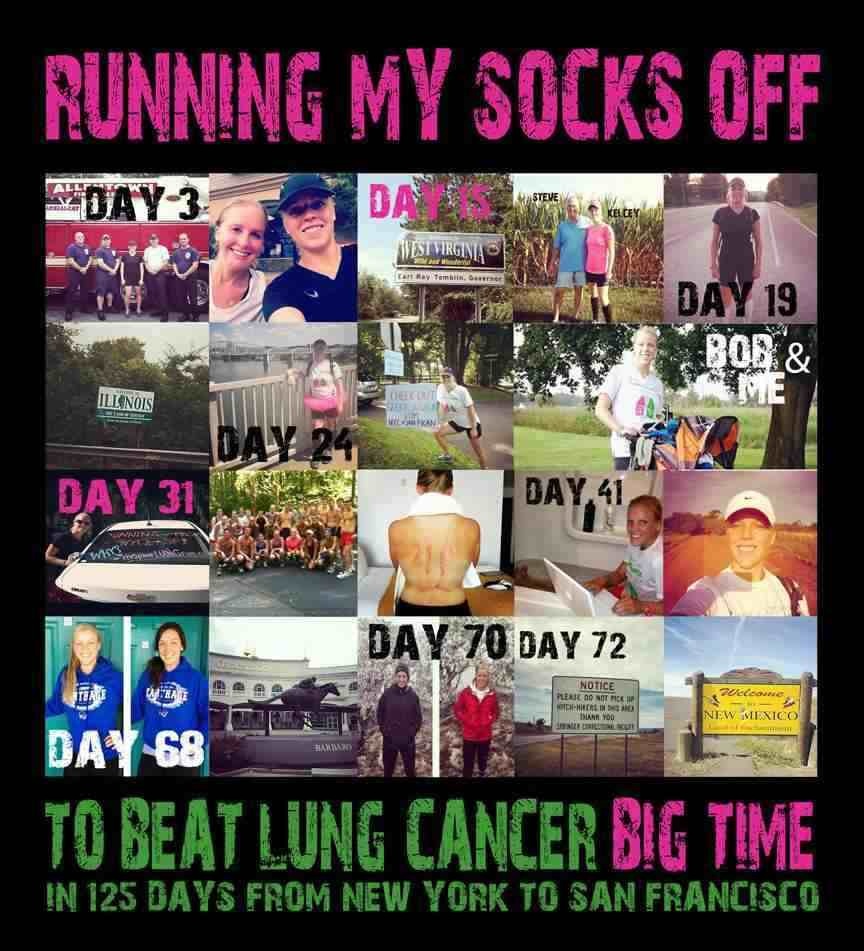 Kelcey Harrison Great Lung Run Blog Post 10/12/12: I realize that I probably have not been as forthcoming about the challenges of this journey and I'm sure many of you have wondered what the most difficult moments have been. Side note: I don’t really like to talk about my feelings...scary! So, that’s why this has been so late in coming. Let me put it out there: there have been break-downs. There have been days that I wanted to call it a quits a few miles early or moments when I felt pangs of homesickness, but those have been pretty few and far between. I know that there is an end date and a finish line, and those two things alone make it easy to get through each and every day of this adventure. Add to it the fact that I have met incredible people along the way, have my buddy and savior Sydney with me, and have Jill as my inspiration every day, and it’s even easier to keep my eyes on the prize. That said, there are moments that literally stop me, hands on my knees and tears in my eyes when I remember why, exactly, I am running across the country. When that young, beautiful, strong girl with clammy hands, forever stunted fingernails, and razor sharp teeth left this world, we lost someone incredibly special. She was special to so many in very unique ways and the pain of that loss can sometimes overwhelm me at an unexpected moment.  Especially over the last month, since Sydney's and my routine has become so consistent, (our routine outlined here, in case you missed that post) it has been easy to think less about the reason that I am doing this run: to honor my friend Jill and to beat lung cancer. It is in the moments when I have allowed myself to truly remember Jill and that I am far from being the only one who lost her, that I have become weak in the knees and shed a tear or two ten. These moments are sad, sure, but I'm not trying to elicit sympathy or make you feel sorry for me. Mostly, because I am not the only one who loved and lost her and what often pains me is thinking about how the rest of her loved ones— parents, family, and friends, also go through each day without her. When we lose someone we sometimes catch ourselves remembering that we are sad at inopportune times. That we miss that person immensely, and that we cannot figure out how or why they are simply, physically gone. In many ways I am grateful for these moments because they mean that I can still picture Jill vividly and that my memory of her is still so close to the surface; that while she may be gone, our collective memories of her keep her around—that giggly, curious, active girl we all grew to love so, so much. In all other aspects, and throughout almost the entire run thus far, I have been pretty positive. I believed that it would all work out and it largely has. I believed that people would be supportive and they have. I believed that it would garner some new attention for lung cancer and it has. But, I have to admit, somewhere in Indiana a terrifying thought occurred to me. It is the only other thing, aside from those overwhelming memories of Jill and our combined loss, that has caused me to cry on the side of the road. Somewhere just before Louisville, KY, my mind was wandering as usual when I suddenly thought, “what if nothing changes after this run? What if no one really pays attention and this run has no impact whatsoever on the future of lung cancer? What if I fail Jill by not making people care enough?” I stopped in my tracks. It was the first time I really allowed myself to think that the Great Lung Run might not "succeed". Luckily, I have incredible people around me who buoyed me back from the bottom and reminded me that we were already reaching new people and providing great education about lung cancer. I have my parents and my extremely wise older sister to thank for quickly reestablishing my positive outlook. The point is, difficult things happen in life. We lose people we love, we endure life's challenges, we go through tough times, and sometimes, we just have to cry or scream or whatever. The important thing is that we acknowledge these moments, take a deep breath, and then remember the bigger picture: to get the word out about lung cancer BIG TIME, and to beat lung cancer for everyone. VISIT THE BONNIE J. ADDARIO LUNG CANCER FOUNDATION WEBSITE VISIT THE JILL'S LEGACY WEBSITE VISIT THE GREAT LUNG RUN WEBSITE
1 Comment
 Taylor Bell by Taylor Bell, Guest Blogger The White House is “Pink” this month, but what will they do for Lung Cancer Awareness in November? NOTHING I’M SURE. Do people even know that November is Lung Cancer awareness month? Unfortunately, I doubt it. Sad. Pathetic. Hurtful. Shameful. Stigmatized. Unrecognized. Underfunded. Unimportant to Most. Why? Because everyone thinks that in order to get Lung Cancer you have to smoke, and because you smoke you somehow deserve lung cancer. NO ONE deserves cancer of any kind. Not all smokers get lung cancer and not all lung cancer patients are smokers. Actually 60% of the newly diagnosed are NEVER smokers or former smokers who quit decades ago. ALL cancers deserve the same recognition and awareness that breast cancer gets. We as a society do a disservice to the general public by hyping up breast cancer as much as we do and ignoring all of the other cancers that effect EVERYONE, specifically lung cancer. I’ve said it before but I am going to say it again. Lung Cancer is the NUMBER ONE cancer killer of MEN AND WOMEN in this nation. It kills more people than breast, prostate, colon and pancreatic cancers combined. It is the least funded of all major cancers and the stagnant 15.5% survival rate has remained unchanged for 40 years. 160,000 people will pass away from lung cancer this year alone in the US. For those of you who don’t know, there is one person who is doing everything humanly possible to raise awareness for this disease. Kelcey Harrison is running across the UNITED STATES. Who can say they have done that? I would be surprised if anyone can say they have accomplished that task. 30-40 miles a day for 18 weeks straight….. What more could a person do to bring awareness to this horrible horrible cancer?! There is NOTHING more she could do. She is giving EVERYTHING possible.  ABC News Photo So, why hasn’t the national news media picked up this story? Who knows? Is it because of the stigma? Is it because it’s not the “pretty pink cancer”? Is it because Lung Cancer doesn’t matter to most people? I mean, the girl is RUNNING ACROSS THE UNITED STATES. Why isn’t the TODAY Show, Good Morning America, Ellen, Oprah, Brian Williams, Rock Center begging her to be on their telecast? STIGMA. PERIOD. That’s right folks, we have stigmatized this disease for so long that we have made everyone think that ONLY smokers get lung cancer and that they deserve it and therefore, Lung Cancer isn’t important. Lung Cancer happens to people from all walks of life, Moms, Dads, Grandparents, Aunts, Uncles, Children, Siblings, Sorority Sisters, Division I College Athletes, NEVER SMOKERS, NFL Wives, Famous Singers and Actors, the list goes on. From the great words of Katie Couric “It’s time to put the blame game aside, and figure out what is really going on.” Please join me in trying to bring much needed awareness to Lung Cancer and bringing publicity to the one person who can say they have given everything humanly possible to raise awareness for this dreaded disease. Please follow @greatlungrun on Twitter or visit her website and fundraising page at www.thegreatlungrun.com and www.Crowdrise.com/thegreatlungrun.
 LiveScience.com LiveScience.com Lung cancer rates are increasing among women and people who have never smoked, a new study finds. Researchers from the French College of General Hospital Respiratory Physicians studied 7,610 lung cancer patients and 7,610 new cases of lung cancer in France in 2010. The study found non-smokers made up 11.9 percent of the lung cancer cases, up from 7.9 percent in 2000. And the percentage of female lung cancer patients jumped from 16 percent to 24.4 percent over the decade. Among women with a history of smoking, lung cancer rates barely changed over those 10 years, hovering around 65 percent. Meanwhile, this figure decreased in men, while the rate of male lung cancer patients who had never smoked increased, the researchers said. Moreover, the study found changes in the severity of the cancer at the time of diagnosis. "Not only has there been an increase in the number of women and non-smokers contracting the disease, but there has also been an increase in the number of cases diagnosed in stage 4 of the illness," lead researcher Dr. Chrystèle Locher said in a statement. This change — 58 percent with stage 4 in 2010 compared with 43 percent in 2000 — might reflect new classifications of different stages of the disease, the researchers said. They also found big changes in the type of cancer being diagnosed. The rate of people developing adenocarcinoma, a form of non-small cell lung cancer, jumped from 35.8 percent to 53.5 percent over the decade. Locher said more research is needed to understand what causes lung cancer in non-smokers, but she pointed to exhaust fumes from diesel engines as one possible factor. (The World Health Organization, WHO, recently classified diesel fumes as carcinogenic.) Past research, presented in 2010 at a conference held by the American Association for Cancer Research, showed that lung cancer is different in non-smokers than in smokers, with non-smoker lung cancer tumors showing more than twice as many DNA changes as tumors in smokers. To combat rising cancer rates among women, Locher said public awareness campaigns might help. "Anti-smoking campaigns must also target women more specifically, as we can see little change in lung cancer rates caused by smoking in women," the researcher said. The results of the study were presented Tuesday, Sept. 4 at the European Respiratory Society's Annual Congress in Vienna. The research has yet to be published in a peer-reviewed scientific journal. This article originally published on Sept. 4th, 2012 at LiveScience.com.
5/17/2012 Donna Summer: #LungCancer Leading Cause of #Cancer Death @bonniejaddario @joegaeta @teamdraftRead Now By Eryn Brown Orginally publshed by the Los Angeles Times on May 17, 2012, 3:16 p.m. Disco legend Donna Summer, 63, died Wednesday night, reportedly of lung cancer. As of press time, her family hadn’t released details about her illness, so it was unknown what type of lung cancer she had, and how long she may have been ailing. According to the American Cancer Society, lung cancer is the leading cause of cancer death in both women and men, killing more than 150,000 people per year -- more than colon, breast, ovarian and prostate cancers combined. In 2012, the group estimates, there will be about 226,000 new cases of lung cancer in the U.S. Survival rates of people with lung cancer are low. Only about half of people diagnosed with early-stage non-small-cell lung cancer (the more common type) survive five years or more after diagnosis; many lung cancer cases aren't discovered until late in the disease's progression, however, because symptoms often don't arise until the disease is advanced. The risk of developing lung cancer increases with age, but it’s not unheard of for relatively young people to die from the disease. Joe Paterno died of lung cancer at 85; Peter Jennings at 67; Christopher Reeve's widow, Dana, at 44. According to some news reports, Summer hoped to keep her medical condition under wraps. The reasons why are unknown -- but according to Rachel Schwartz, a spokeswoman for the Lung Cancer Foundation of America, it’s not unusual for people with lung cancer to feel ashamed of having the disease, because it is so closely associated with a negative behavior: smoking. "Many famous people who have lung cancer never disclose this fact, which speaks to the huge stigma of this disease," Schwartz wrote in an email. "The stigma of the disease is crushing and any announcement of a lung cancer diagnosis is often accompanied by an assumption that you somehow brought the disease upon yourself." Smoking is the leading risk factor for lung cancer, causing about 90% of the cases, according to the U.S. Centers for Disease Control and Prevention. But about 60% of new lung cancer patients either never smoked or haven’t smoked for many years, Schwartz said. Reeve was a non-smoker; Jennings a 20-year former smoker who admitted to relapses here and there. Second-hand smoke is a known carcinogen. A Web search did not reveal if Summer smoked. News outlets reported Thursday that she believed she developed lung cancer after breathing in dangerous particles in the air in the aftermath of New York's Sept. 11 attacks. Copyright © 2012, Los Angeles Times 5/13/2012 This #MothersDay, Let's Remember That #LungCancer is a "Contemporary Epidemic #in American Women"Read NowWomen who smoke or used to smoke do not deserve lung cancer. No one does.
Lung cancer is the #1 cancer killer of women. It accounts for 1 of 4 cancer deaths among women, killing more each year than breast, uterine and ovarian cancers combined. In the U.S., 17,000 women who had never smoked in their lives die from lung cancer each year. This is over four times the number of cervical cancer deaths. The rate of lung cancer among women has risen 60% since 1990. It surpassed breast cancer as the #1 cancer killer of women in 1987. 31,000 more women die each year from lung cancer than from breast cancer. Learn more about women and lung cancer in this groundbreaking report. Remember to honor your mother today and everyday.... by Rick Montgomery
This article was originally published in the Kansas City Star on May 5th, 2012. A pesky cough, that's all. The last thing on Michaelle Gall's mind was late-stage lung cancer. She had just turned 41. She was a physically fit mom and nonsmoker, except for the rare social occasions when some friends might light up. What created the Lenexa woman's tumors is a mystery. It's that way each year for tens of thousands of Americans, mostly women, who defy the conventional profile of a lung cancer patient. With smoking rates plummeting and U.S. deaths to lung cancer dropping, research shows that roughly one in five women now diagnosed seldom, if ever, put a cigarette to their lips. The same is thought to be true for about one in 10 men. Only in recent years have scientists begun to explore why. For Gall, the coughing that arose around Christmas led to a doctor visit in January. "I turned 41 that month and less than a month later, I find out I'm a lung cancer survivor." Added Gall, upbeat in manner but still adjusting to the shock: "I say 'survivor' because a nurse told me that now I know I have it, I should consider myself a survivor." Her treatment is just beginning, and doctors are hopeful she'll benefit from a new drug that targets a genetic abnormality found in Gall and a small percentage of other cancer patients. The larger question, yet to be answered, is why lung cancer not linked to a history of smoking appears more apt to strike women than men. The peripheral hazards would seem just as dangerous to men: exposure to radon gas in the basement, or to asbestos, or to secondhand smoke. Genetics and air pollutants can also trigger the disease, as can unventilated cooking oil fumes, which in some parts of the world is related to women's work. And there's this question: In an age of anti-smoking campaigns proving so successful in cutting lung cancer deaths, how should society deal with the others -- those patients rocked by the news that they have an often deadly condition through no fault of their own? "The nonsmokers who survive lung cancer are some of our best advocates for awareness," said Regina Vidaver of the National Lung Cancer Partnership, which advocates for increased federal funding of research. "They're free from that stigma that society places, I'd say unjustly, on smokers who get sick." The group is not tiny. Of the 200,000 or so Americans diagnosed yearly with lung cancer, about 15 percent -- or 30,000 -- are nonsmokers, studies suggest. Even if we took away all of the smokers and ex-smokers from the pool of patients, lung cancer would rank seventh among the leading types of cancer afflicting the U.S. public. Two-thirds of nonsmokers now battling the disease are women. That could be a function of statistical probability, some researchers say. Women in the general population smoke less than men and would probably represent the majority of any group of nonsmokers, including those with cancer. Still, some studies raise the possibility that women may actually be more susceptible. Stanford University oncologist Heather A. Wakelee headed up a 2007 study that found lung cancer rates among "never smokers" ranged from 4.8 to 13.7 per 100,000 men in a year, and 14.4 to 20.8 per 100,000 women. "Those of us who treat the disease get a sense that these incidence rates for nonsmokers are increasing," Wakelee said in a telephone interview. "But getting firm numbers is tricky" because the national cancer registry does not collect data on patients' smoking habits. On the positive side, emerging research leads doctors to believe that nonsmoking women -- those who have smoked fewer than 100 cigarettes in their lifetime -- tend to respond better to treatment than nonsmoking men do. "What is causing these cancers in people who don't smoke? We don't know, and I doubt we'll ever find a particular cause," said oncologist Ramaswamy Govindan at the Washington University School of Medicine in St. Louis. "It could be genetic, or a combination of factors. ... It's mostly bad luck. A random thing." Never smoked Montessa Lee was 28 when she was diagnosed. The Maryland schoolteacher had classic symptoms of lung cancer -- shortness of breath, stabbing pains in the chest, discomfort in her back and neck. But because she had never smoked, Lee and her doctors assumed she was asthmatic or had come down with bronchitis. Antibiotics were prescribed. Months passed and the symptoms worsened. Maybe a heart problem, the doctors thought. By the time they zeroed in on the possibility of lung cancer, Lee had developed a tumor 15 centimeters wide. "I became angry because back then -- in 2006 -- there wasn't much research on younger nonsmokers who got cancer. It was all about smoking," she said. "I wound up turning my anger into advocacy. I had a lot of faith and family support, and I knew this was going to become a healing testimony." Lee withstood a regimen of chemotherapy and radiation treatments and has been cancer-free for five years. "Because science has turned more attention to people like me, now there's hope," she said. Public awareness of lung cancer afflicting nonsmoking women rose with the 2006 death of Dana Reeve, the 44-year-old widow of actor Christopher Reeve. Reports the following year in the Journal of Clinical Oncology estimated "that 15 percent of men and 53 percent of all women with lung cancer worldwide are never smokers," though researchers were stumped about the reasons. In Asia, high rates of women diagnosed with lung cancer were linked to heavy exposure to unventilated smoke of cooking oils used in Asian dishes, a problem not thought to be serious in the United States. In recent years, scientists have been examining the role of estrogen in the spread of lung cancer and its potential treatment. Joan Schiller, deputy director of the Simmons Cancer Center in Texas, told the American Society of Clinical Oncologists in a 2010 interview: "This is such a relatively new field, we're just beginning to explore all the options. ... Perhaps estrogen is driving lung cancer in some people, just as estrogen drives breast cancer in some people." If so, estrogen receptors could be targeted in therapy to drive the cancer out, she said. In Gall's case, a drug approved for lung cancer patients just last summer could be a lifesaver. Crizotinib, developed by Pfizer under the brand name Xalkori, has been found to shrink or stabilize tumors in patients carrying a gene mutation known as ALK, or anaplastic lymphoma kinase. The U.S. Food and Drug Administration sped up approval of the oral drug for some patients diagnosed with non-small-cell lung cancer after weighing the drug's success in attacking other kinds of cancer. Gall is one of about 9,000 Americans diagnosed annually whose cancer appears driven by the ALK mutation. "The timing of this drug's approval was very fortunate for her," said her oncologist, Chao Huang, who works for the University of Kansas and VA hospitals. Gall said she hopes the medication will keep her from having to undergo chemotherapy. As for the emotional toll of hearing she has lung cancer -- and being clueless to how she got it -- Gall resists thoughts that might distract from her goal to get well. "I try not to dwell on the why because it just takes you down a rabbit hole, and that's not good," she said. "I try to look forward and not backward." Husband Kurt bought a radon detection kit to check their home's levels of the odorless, ground-emitting gas. The test confirmed all was safe. Back pain For Judy Stephens, the symptoms began with back pain that would migrate to her upper right leg. "It was the classic picture of, say, a pinched nerve," said her son, Thad Stephens, an emergency room physician in Johnson County. He arranged for a CT scan, then a full body scan. The discovery of a tailbone tumor that had spread from the lungs stunned the family. "I was bitter, thinking of these little old ladies who smoked all their lives and never got cancer," Thad Stephens said. "Mom never did anything to hurt herself." Having not once smoked, Judy Stephens at age 71 was told her lung cancer would claim her in three to six months. She battled bravely for 16 months, aided by an experimental drug called Tarceva, which has been found to help some female cancer patients in their post-menopause years. Her death last October happened to coincide with new recommendations issued by the National Comprehensive Cancer Network, a professional medical group. The network for the first time called for lung cancer screening using low-dose CT -- but only for older, heavy smokers. Judy Stephens' family could not help but wonder how she got sick. Suspicion turned to the basement of her Shawnee home, where she spent time at the sewing machine stitching dresses for her doll collection. Could she have absorbed too much radon over the years? Did ceramic dust that would accumulate when she made and repaired dolls drift into her lungs? Was it secondhand smoke from her husband's habit, which he gave up more than 30 years ago? All speculation. No answers. "We've done such a good job with smoking cessation messages, people think it's the only way of developing lung cancer -- and that's a dangerous assumption," said Vidaver of the National Lung Cancer Partnership. "You need to listen to your body." Gall did just that, and her primary care physician reacted quickly in scheduling a chest X-ray that revealed suspicious shadows. Experts caution that chest X-rays and CT scans shouldn't be relied upon routinely and their ability to detect lung cancer is far from foolproof. Your cough in most cases is just a cough, but one that persists for weeks should be brought to a physician's attention, whether you smoke or not. "Whatever I can put forward to raise awareness and help prevention, maybe that's what I've been chosen to do," said Gall, who works for the Community Blood Center. She noted that her profession is to help people in life-threatening situations. And suddenly, out of the blue, those people include her. To reach Rick Montgomery, call 816-234-4410 or send email to [email protected]. |
Details
|




 RSS Feed
RSS Feed
